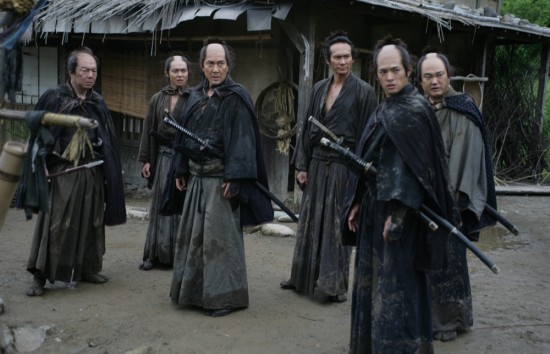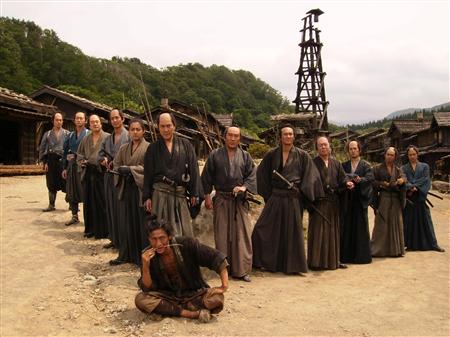|
13 Assassins
Reviewed
by Damien
Straker on
September 4th, 2011
Icon Film Distribution presents
a film directed by Takashi
Miike
Screenplay
by Daisuke Tengan
Starring:
Goro Inagaki, Koji Yakusho, Takayuki Yamada, Yusukie Iseya
Running
Time:
126 minutes
Rating: TBA
Released:
September 8th,
2011
|
3/10
|
|
13 Assassins is set
in the 1830s in Feudal Japan. Madman Lord Naritsugu Matsudaira (Gorô Inagaki) is on a killing spree,
murdering people at will, raping a woman and using children as a pincushion. He
is nearly untouchable as he is the son of a Shogun. It is feared that if this
lunatic reaches a new clan he will be untouchable. A former samurai warrior in
Shinzaemon (Kôji Yakusho) is
brought in to take out Naritsugu before he can reach his destination. He brings
in eleven other warriors to help him and they secretly plot the ambush. One of
the men is Shinzaemon’s nephew (Takayuki Yamada) and he has to explain to him
that this is a gamble worth fighting for. On their way to a village they find
their thirteenth warrior in a colourful hunter named Kiga (Yusuke Iseya). He’s more of a misfit that a true samurai. The group takes
shelter in a village, working to block off the path of their target. But just
as the ambush is about to begin they realise that they are not being faced with
seventy men, as originally expected, but over two hundred soldiers.

All of
the bloodletting in 13 Assassins is
skin-deep. That’s not to say the film isn’t violent. The opening of the film is
sickening as we see a man commit Harakiri by plunging a blade into his stomach.
There are grotesque images in this film that are difficult to watch too. A
starving woman, who has had her limbs lopped off and her tongue cut out, is
revealed to Shinzaemon and the audience. What does this all mean though? You
can read the film as a Dirty Dozen-like
imitation with moments of courage against insurmountable odds. But there’s
little beyond that mere incision. It is difficult to find inspiration in these
characters because they are so broadly drawn. The film would have been better
with fewer assassins, who were more complete characters, instead of these vague
constructs like the comic relief guy or the wise old samurai. And with little
knowledge of this foreign cast, I found it very difficult to tell the more
obscure members of the group apart because they are so similar in type. They
can do little to distinguish themselves emotionally with stilted dialogue
either. When one of the men is leaving his partner at home he tells her: “If
I’m late...I’m at the festival of death”. Maybe it reads better in a native
tongue. That’s a big ‘maybe’. There are bigger problems relating to the film’s
politics than just the actors though. The film seems convinced by individual
sacrifice and the glory of gambling your life in moments of national crisis.

Contextually
that might seem honourable and moving for some. But there’s a refusal to
critique or deconstruct the questions of sacrifice in a meaningful way. It
makes the film seem primitive, without making a point of it. And it’s equally
uncomfortable to watch when you consider how much real mindless bloodshed we’re
exposed to today. One of the film’s major selling points is that the final
battle rages on for forty minutes. Twenty
minutes is too long for me and anything over that is just excessive. The first
half plays like a cartoon and is at odds with the grittiness of the violence
shown earlier. The group cut down hordes of men without being touched. Where is
the tension? And there are silly portions of the battle that diminish the
realism. Where did the giant bamboo gates they use to block the baddies
suddenly come from? And who let the CGI cattle on fire? In the last twenty minutes it washes over you
so much that what happens seems of little relevance. The film is well crafted
in respects to costume and set design. But it lacks the visual inventiveness
and symbolism of similar oriental epics like Hero (2002) with its selective use of colour. A lot of scenes here
are overly dark and the film’s tones during the day are endlessly grey and
washed-out. Perhaps this film will be more attuned to those acquainted with
Japanese history than a dopey Westerner. But I found the continuously mindless
slaughter unspectacular and extremely difficult to sit through.
|